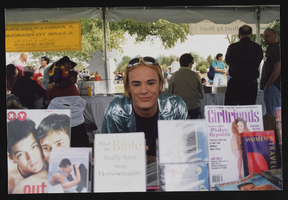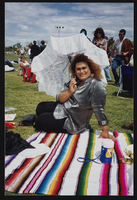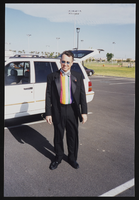Search the Special Collections and Archives Portal
Search Results
Archives and libraries
Level of Description
Archival Collection
Collection Name: Dennis McBride Collection on LGBTQ Las Vegas, Nevada
Box/Folder: N/A
Archival Component
Audio recording clips of interview with Hazel Gay by Claytee D. White, December 2, 1995
Date
Archival Collection
Description
Three audio clips from an interview with Hazel Gay conducted by Claytee D. White on December 2, 1995. Hazel and her husband Jimmy Gay moved to Las Vegas in 1946, becoming leaders in the African American community during the civil rights era. In the clips, Gay recalls the Moulin Rouge from her perspective as manager of the dress shop.
Sound

Michael Conarroe at Gay Pride: photographic print
Date
Archival Collection
Description
Image
Southern Nevada Jewish Heritage Project Web Archive
Identifier
Abstract
The Southern Nevada Jewish Heritage Project Web Archive contains archived websites that were captured between 2016 to 2018 that are related to UNLV University Libraries community documentation project, the
Archival Collection
Ruth Poirier oral history interview
Identifier
Abstract
Oral history interview with Ruth Poirier conducted by Joanne Goodwin on February 05, 2003 for the Women's Research Institute of Nevada (WRIN) Las Vegas Women Oral History Project. Poirier opens her interview by discussing her partner Doris Pressler, who had passed away before the interview. She describes Doris' upbringing, her role in the first band at the Roseland Ballroom in New York, and explains how an all-women band in the 1930s and 1940s was a phenomenon. Poirier then discusses her own history, including how she became involved in music and all-women bands, and how she met Doris. Poirier describes in detail the importance of music to her family, the types of music she played, and what it was like to be a musician during the Depression. She talks about her relationship with Doris and recalls early interactions with other gay youths. Poirer ends her interview explaining why she and Doris decided to settle in Las Vegas, Nevada, and describes their impressions and involvement with the local LGBTQ+ community.
Archival Collection

Zina Tago at Gay Pride: photographic print
Date
Archival Collection
Description
Gay Pride at Sunset Park, 1998. Photographer: Dennis McBride. Zina Tago. At Sunset Park, 4-25-98.
Image
Junior League of Las Vegas Oral History Project
Identifier
Abstract
The Junior League of Las Vegas Oral History Project (2011-2019) consists of five oral history interviews conducted by Carole Terry between 2011 and 2019. Interviewees discuss their experiences living in Las Vegas and being part of the Junior League of Las Vegas. Interviews exist as physical transcripts only; no audio is available.
Archival Collection

Rob Schlegel at Gay Pride: photographic print
Date
Archival Collection
Description
The third annual Gay Pride parade at Sunset Park, 1999. Photographer: Dennis McBride; Rob Schlegel. (5-8-99)
Image
Raul Daniels oral history interview
Identifier
Abstract
Oral history interview with Raul Daniels conducted by Maribel Estrada Calderon on July 03, 2019 for the Latinx Voices of Southern Nevada Oral History Project. In this interview, Daniels discusses his childhood memories of Cuauhtémoc, Mexico and later moving to Las Vegas, Nevada with his family in 1989. He talks about his father’s employment in construction and joining the painters union. Daniels then recalls attending Las Vegas High School, receiving his citizenship, and his experiences attending the University of Nevada, Las Vegas. Daniels describes learning about The LGBTQ Center of Southern Nevada, studying international business, his employment at Neiman Marcus, and eventually becoming the Vice President of Catering with Station Casinos. Later, Daniels discusses what The Center meant to him as a gay teen and being a member of the Student Organization of Latinos (SOL). Lastly, Daniels recalls going through the adoption process for his son and talks about Aids for Aids Nevada (AFAN).
Archival Collection
Archives, 1983
Level of Description
Archival Collection
Collection Name: University of Nevada, Las Vegas Office of Vice President for Academic Affairs Records
Box/Folder: Box 079
Archival Component
